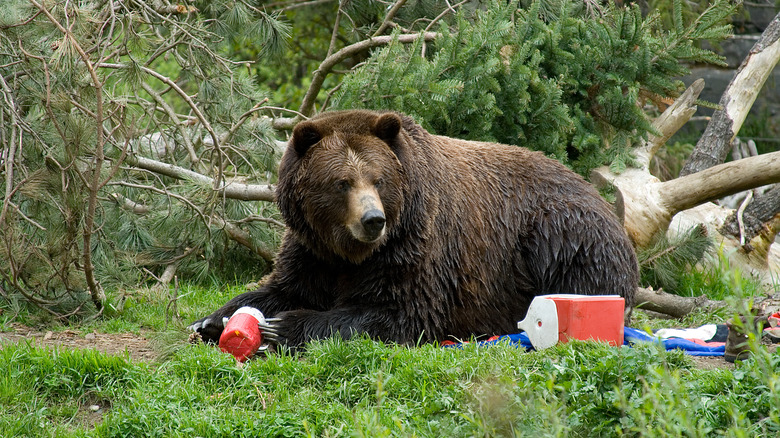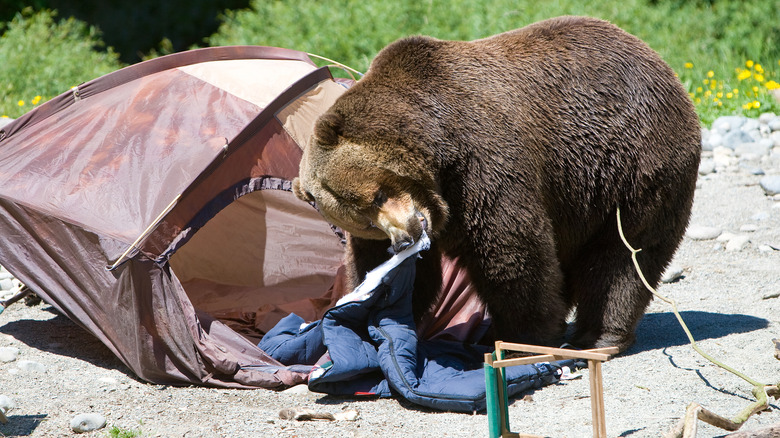Keep Bears Away From Your Campsite With The Help Of This Cleaning Product
With its breathtaking landscapes and quiet moments of contemplation, embarking on a camping trip means getting the chance to reconnect with nature, escape the hustle and bustle, and even challenge yourself in new ways. However, venturing out into the wilderness isn't necessarily a straightforward deal — and in some cases, it requires even more preparation than you think. From choosing the right camping gear that'll fit within your budget to packing appropriate clothing and planning meals, avid campers know that successful camping is all about staying comfortable, well-equipped, and safe from the elements. And most importantly, this includes factoring in the occasional wildlife encounter — from dealing with insects to unexpected run-ins with larger animals, like bears.
When camping in bear country, safety becomes even more important. Although bears are magnificent creatures, you really don't want them wandering into your campsite looking for food or interesting scents. And while it's important to both know how to pack your food properly and how to keep your campsite clean, there's a common household essential that will have bears running for the hills: ammonia.
Bears hate the smell of ammonia
In terms of wildlife safety and when it comes to enjoying the great outdoors, bear awareness is crucial. In fact, in addition to improper food storage, there are a few other things you might be doing that actually attract bears — even if you don't realize it. Bears have an incredibly powerful sense of smell that's estimated to be about 2,000 times stronger than humans. As such, they're naturally drawn to a wide range of scents — from berries to nuts, fish to roots, and especially that leftover chili. On top of that, they're also pretty susceptible to non-food items like deodorant or sunscreen — which basically means almost anything scented in your campsite could be a potential bear attractant. That's where ammonia comes in.
A common household item typically used for disinfecting and cleaning, ammonia has a strong and pungent scent that bears find particularly unpleasant. Given this unexpected bear-repelling property, experts recommend soaking dish rags in the cleaning solution and then carefully placing them around your campsite to create an invisible barrier that'll deter even the most curious bears.
Just make sure you don't go too overboard with the placement — and under no circumstances should you think about spraying the ground or bears directly with ammonia (or creating ammonia-filled "bear bombs"). Nature doesn't need to be drenched in harsh chemicals, and angering a bear (as well as potentially blinding it) can escalate the situation very quickly.
More ways to bear-proof your campsite
Ammonia aside, there are several other things you can do to help protect your campsite. First and foremost, proper food storage is crucial. Make sure you never leave food or coolers out during the day or overnight. Instead, store all of your food, cooking equipment, and scented items in a bear-proof locker or in a locked car. If you're in the backcountry, store your food in a bear bag that's at least 160 feet from your tent. And whatever you do, don't sleep with your food to try and "guard it" — a hungry bear won't care that you're trying to hide your trail mix under your pillow.
You'll also want to clean up any spills immediately and wash your dishes far from your campsite — ideally, a minimum of 100 feet away – straining bits of food from your dishwater and packing them with your garbage. Make sure to collect all of your garbage and store it securely.
Lastly, if you do happen to receive an unwanted visit from a bear, try your best to stay calm and act quickly. Make loud noises by shouting or clapping to try and scare it away, or carry an air horn that'll startle it. If this doesn't seem to be working, exit your tent with a flashlight and bear spray — and be prepared to use them if necessary. Just remember that the goal here is to appear intimidating — not to pick a fight with the bear — so always leave an escape route available for them.


